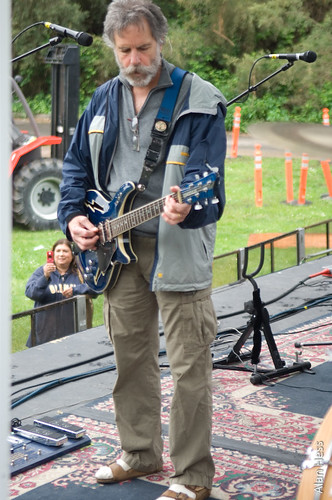Grateful Dead lawyer Harold 'Hal' Kant, 77, dies
Saturday, October 25, 2008 | 9:10 p.m. CDT
BY DENNIS MCLELLAN, THE LOS ANGELES TIMES
Harold "Hal" Kant, the Grateful Dead's longtime principal lawyer and corporate general counsel who spent more than three decades helping protect the legendary rock band's lucrative musical legacy, died. He was 77.
Kant died of pancreatic cancer Oct. 19 at his home in Reno, Nev., said his son, Jonas.
Once described in The National Law Journal as a "conservative, Republican, poker-playing opera fan,'' the bearded, Bronx-born lawyer launched his more than 35-year association with the Northern California band in 1971.
Grateful Dead co-founder Bob Weir described Kant last week as a "dear friend,'' who was "most instructive to us.''
"The Grateful Dead was known for its revolutionary approach to the music industry, and Hal was part and parcel of that,'' Weir said in a statement. "We wanted a place for humanity in a business that more resembled a nightmare circus than much else, and he helped us find it.''
With tongue in cheek, Kant's Grateful Dead business cards described his title with the band, whose lead guitarist, Jerry Garcia, died in 1995, simply as "Czar.''
"He oversaw every aspect of their business, whether licensing, touring, trademarks, merchandise or Garcia getting busted for drugs,'' said Jonas Kant, a music lawyer and a senior vice president at Sony/ATV Music Publishing.
"They were known for being a free-loving, peace-loving band, but he helped them run everything like a structured business,'' he said.
Kant, who accompanied the band on various tours, "did all of their recording and music publishing agreements,'' his son said. "He was renowned for being very much ahead of his time in terms of protecting the artists' and songwriters' rights.''
Kant ensured the masters of the Grateful Dead's recordings and copyrights in the music would be owned by the band, his son said. He also enlisted an Oakland, Calif., law firm to handle enforcement of the band's trademarks.
Dennis McNally, author of the 2002 biography "A Long Strange Trip: The Inside History of the Grateful Dead,'' said Kant "was a significant force in keeping them together by having the business function well so that they could do what they wanted to do, which is play music.''
When Ben & Jerry's ice cream produced a new flavor, Cherry Garcia, in the early '90s, McNally wrote in his book, the company did so without even discussing the idea with Garcia. Although Garcia was unconcerned when it was first brought to his attention — "At least they're not naming a motor oil after me, man,'' he said — Kant convinced him the issue should be addressed.
As recounted by McNally, Kant told Garcia: "They will name a motor oil after you if you don't confront this, Jerry. You'll have no control over your name at all.''
Garcia finally told Kant, "If it bothers you, go ahead.''
"In the next few years,'' McNally wrote, "Jerry would have no problems in spending the large sum of money he'd earn thanks to the letter Kant wrote (to Ben & Jerry's).''
Kant remained the band's general counsel until around 2000, but he continued to represent Ice-Nine, the band's music publishing company, until his death.
He also was a lifelong poker player, who cut classes at DeWitt Clinton High School in the Bronx to play penny poker with other kids in a clubhouse in the cellar of a tenement house.
With a penchant for wearing a cowboy hat and boots and smoking Cuban cigars, Kant began playing casino poker in 1984 and won the World Series of Poker in 1987.
The rule he followed at both the gaming table and the conference table, he said, is "you have to be willing to go all-out. Bluffing is OK, but you have to be willing to take the downside if you lose.''
The son of eastern European immigrants who owned a dry-cleaning store in the Bronx, Kant was born July 29, 1931. He received a bachelor's degree in psychology from the University of Washington and a master's degree in clinical psychology from Pennsylvania State University.
After a stint in the Army working as a psychologist at an Army hospital, he went to Harvard, where he received his law degree with honors in 1958.
He was a clerk for Judge William Orr of the 9th U.S. Circuit Court of Appeals in San Francisco before joining a Beverly Hills, Calif., law firm in 1959. In a few years, he launched his own general business law practice and eventually began representing movie industry clients.
During that time, he told The Boston Globe in 2000, he noticed, "The only attorneys in the music business were the attorneys for the record companies, and their job was to get as much money as they could for their company and leave as little as possible for the artists. I decided, maybe the other guys should have an attorney, too.''
He began by handling the Association and in time represented artists including Sonny & Cher, Stevie Ray Vaughan, Big Brother and the Holding Company, Hot Tuna, and Captain Beefheart.
The Grateful Dead made up only a small part of his work until 1987 when, according to The National Law Journal story, the band's revenues soared from $15 million per year to $100 million per year. Kant then withdrew from the rest of his practice and devoted the majority of his time to the band.
Kant, who was executive director of the Legal and Behavioral Institute in Los Angeles in the '70s, also was a co-author of the 1973 book "Pornography and Sexual Deviance.''
In addition to his son Jonas, Kant is survived by his wife, Jesse; two other sons, Garth and Tony; his sisters, Charlotte Silverman and Thelma Sameth; his step-children, Cameron Cassidy Sloane and Sean Cassidy; and five grandchildren.
1 week ago






